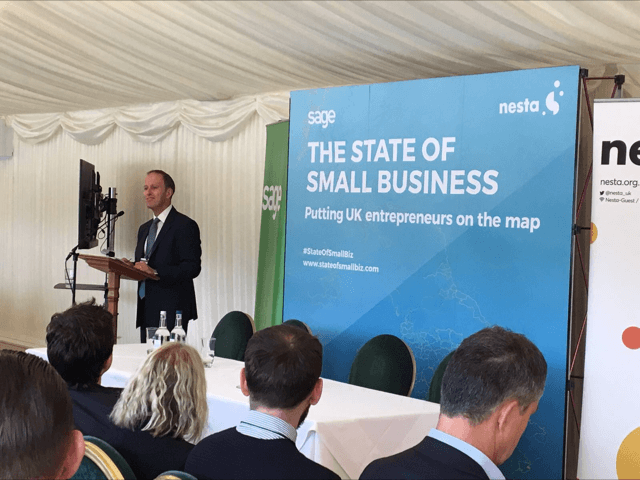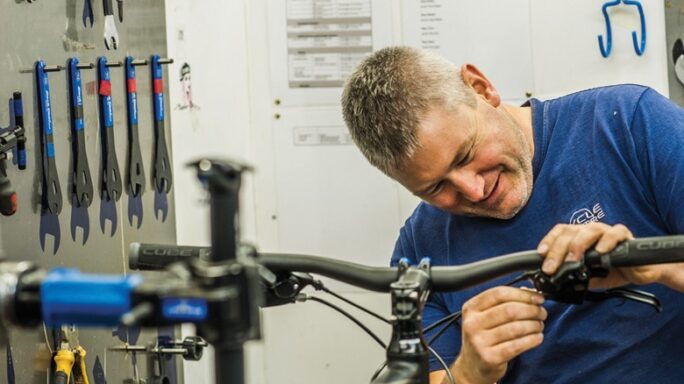Money Matters
Does where you work in the UK impact how successful you can be?

We know, through the work we do with customers and partners, that entrepreneurs face different challenges depending where in the country they work from.
To find out more we partnered with Nesta (an innovation foundation) who authored a report highlighting a concerning productivity gap in the UK. It revealed that SMEs in some local authorities are up to 26 times more productive than others, with local initiatives, business death rates and education all playing a part.
Sage understands the challenges involved in making your entrepreneurial ambitions become a business reality, having started as a small business with big ambitions in 1981.
We’re really proud of UK entrepreneurs and want to showcase their brilliance. Despite ongoing economic and political instability, they’ve shown significant resilience, with 29% more SMEs trading since 2007.
But what can businesses do to help bridge the productivity gap that is so evident?
Knowing about the support is half the battle
We launched our report in the House of Commons with support from Vicky Moore MP, BBC Radio 4 business presenter Dominic O’Connell and British businesswoman Emma Sinclair MBE.
A clear message was that UK SMEs are blessed with resources and assistance. Emma, who co-founded software firm EnterpriseJungle, made the point that today’s UK SMEs have a “dazzling” array of resources that can be drawn upon.
While Stephen Roper, Professor of Enterprise at Warwick Business School, was in agreement, he pointed out those resources and bodies behind them are ever changing in England.
And one issue that’s clear is even though there’s a wealth of resources, not all businesses know what support is available to them.
What’s more, the forthcoming Industrial Strategy, which was announced in the 2016 Autumn Statement, is likely to change everything all over again. This could make it more difficult for businesses to know where exactly to go for support.

BBC Radio 4 business presenter Dominic O’Connell speaks at The State of Small Business launch
Essential business support
So, to help, we’ve picked some resources that could make a real impact to your business:
- Thinking of turning your business dream into a reality? The School for Start-ups gives practical advice for budding entrepreneurs.
- Sage Advice is the go-to source for businesses and accountants seeking practical advice and insights on managing everything from money to people. You can subscribe to the newsletter to receive the latest news, tips and advice straight to your inbox.
- National Enterprise Network offers impartial and independent advice, offering you support and training on starting or developing your small business.
- Enterprise Nation is a great community if you want to grow your business.
- The Federation of Small Business is a membership organisation that offers a wide range of vital business services, including advice, financial expertise and support, and it’s a powerful voice in government. It also offers you great local networking opportunities too.
- TED is an organisation that is dedicated to sharing ideas relevant to business leaders. It largely does this through its popular, insightful, inspirational and hugely motivational talks (Ted Talks, as they are known). There are some great presentations on building confidence too.
How to invest in your business
However, what if you have all the information you need but don’t know what do with it?
Dominic said in his experience, SMEs thrive if they have invested in three things: links with a local university, strong inward investment and a focus on local business leaders.
To do this, you need to do the following:
Understand how you can support a university
This can be done in numerous ways, such as through support with training, mentoring or work experience. Creating links in these ways can offer so much value to a business.
You can use universities to share knowledge and insights, source new employees and network with key opinion leaders within a local community.
Establish what you need investment for
This will dictate the types of organisation you should build relationships with. A good starting point is approaching a business that you respect and aspire to be like and ask how they got to where they are – perhaps even using a leader there as a business mentor.
A lot of smaller businesses are using crowdfunding as a great source of investment – sources such as Crowdcube may be worth considering if it is finance rather than advice that you need. Finally, this government page signposts businesses to financial support on offer for a range of sectors.
Network with the right people
Don’t underestimate the importance of networking. However, it must be at the right events, where the right people will be there for you.
If you are a sportswear retailer, attending a pharmaceutical event probably won’t be relevant to you.
Seems simple but you could be so easily pulled into attending anything for fear of missing out.
Check in with your local city council to see if they are running any business events; your local Chamber of Commerce will have an extensive list of events too.
It’s also worth creating a list of relevant leading business people related to your sector – and your ambitions as a business owner – that you could potentially network with.
Approach them personally (at an event or via social media, for example) about how you would like to learn from their business success to gain business insight. They may be busy but if you approach them in the right way, there’s a chance they will make time to support you however they can.
However, it’s not just about the information and support available. Emma admitted you need to be confident about your ambitions. She said there’s “no need to hide behind British modesty” – be proud but remember that there is also no shame in failure. And she’s right.
Shout loud and be proud.
Want to discover how productive your UK region is? Read The State of Small Business to find out more.






I have just purchased a pre owned ACT 2007 it wont load on my Windows 10 lap top, are the any software updates or has it been abandoned and ive wasted my money?